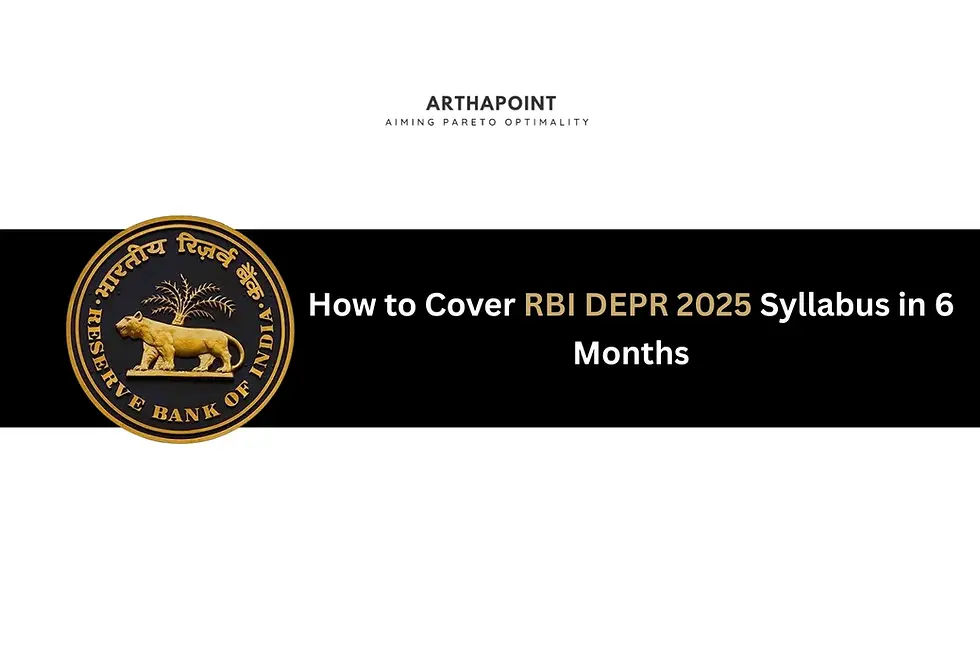Quantitative Economics in RBI DEPR 2025: A Practical Way to Tackle the Hard Parts
- ArthaPoint
- Sep 24, 2025
- 4 min read
Every RBI DEPR aspirant has that one section they secretly dread. For many, it’s Quantitative Economics. Numbers, models, time series, derivations… the list feels endless. But the good news? It’s not an unscalable cliff. With a little structure and the right help, you can actually make this your strongest area.
One place a lot of candidates turn to is RBI Grade B DEPR Coaching at ArthaPoint Plus. Why? Because it gives you a map when everyone else is wandering through a maze.
Why Does This Part Feel So Tough?
Think about it: most of us study probability, statistics and econometrics in bits and pieces at college. Then, suddenly, the DEPR syllabus expects you to stitch it all together and apply it to policy data. That’s a big jump.
Complex models. Long derivations. A mix of math and economics. Even a small gap in the basics can snowball into confusion later. No wonder so many aspirants panic.
First Things First: Know What You’re Up Against
Would you start a trek without looking at the trail map? Same rule here. Before you touch a book, open the syllabus and mark the Quantitative Economics parts:
probability and distributions
regression and econometric models
time series and forecasting
optimisation and growth models
When you can see the terrain clearly, you stop wasting energy on the wrong hills.
Brick by Brick, Not in One Go
This is where most candidates go wrong. They try to “cover” everything at once. Instead, spend a week or two shoring up your undergraduate maths. Build your own formula sheets. Use simple examples first — like working out regressions on mock inflation data — before you dive into full-scale policy datasets.
Can you carve out just an hour a day for this? Short, regular study blocks beat marathon sessions every time.
Don’t Just Read. Work With the Numbers
Learning Quantitative Economics only from theory is like trying to learn swimming by watching videos. The DEPR exam wants you to apply, not just define.
Work through previous year papers.
Sit for timed mini-tests every weekend.
Re-solve your mistakes and explain the logic out loud as if teaching a friend.
This habit builds speed and confidence without you even realising it.
Link It With Real-World Data
Here’s a secret top scorers use: they practice with real data from RBI, MOSPI or World Bank instead of only textbook examples. It’s more interesting, and it trains you to write better interpretations in descriptive answers.
Mock Tests: Your Pressure Practice
Mock tests aren’t just for the final phase. They’re a feedback loop. They show you weak spots faster than any book can. ArthaPoint Plus, for example, gives DEPR-specific mocks so you’re never blindsided.
How RBI Grade B DEPR Coaching Fits In
Self-study gets you only so far. A good course saves you time and keeps you honest. At ArthaPoint Plus you’ll find:
live and recorded classes so you can revisit tough topics
teachers who’ve taught advanced economics, not just beginners
problem banks arranged chapter-wise
weekly updates that blend current data with core concepts
It’s like having a GPS when everyone else is using a hand-drawn map.
A Month-by-Month Blueprint
Foundation month: clear your basics in probability and statistics.Application month: dive into regression, hypothesis testing and time series with real datasets.Integration month: mix theory and problem solving, attempt full-length papers, keep an error log.Refinement phase: daily revision of formulae and mistakes, mocks twice a week, focus only on weak areas.
Breaking it up this way takes the overwhelm out of the process.
A Few “Insider” Habits
Teach a concept to a friend — if you can explain it simply, you know it.
Color-code your notes for formulas, assumptions and pitfalls.
Practise writing derivations neatly. Examiners reward clarity.
Skim RBI’s own publications like Monetary Policy Reports to connect theory with live data.
Mistakes You Can Skip Entirely
Skipping mock tests because you “don’t feel ready”.
Memorising derivations without grasping the logic.
Leaving data interpretation for the last week.
Why repeat someone else’s pain when you can dodge it now?
Mindset Makes the Difference
Stop thinking of Quantitative Economics as a monster. Think of it as a toolkit. Every problem you solve adds a tool. By exam day, you’ll have a full kit ready.
Ask yourself: do you want to scrape through or stand out? The answer determines whether you take a disciplined, guided path or keep improvising.
Wrapping Up
Quantitative Economics in RBI DEPR 2025 can either trip you up or carry you ahead of the crowd. The difference lies in how you prepare: know the syllabus, strengthen your basics, practise relentlessly, and link your learning to real-world data.
And don’t be shy about getting help. RBI Grade B DEPR Coaching at ArthaPoint Plus gives you expert mentors, structured resources and exam-focused strategies. You’re not left guessing what matters.
Your first small step today — even just opening the syllabus and planning your hour — can set you up for a big win in the months ahead. Ready to start?





Comments